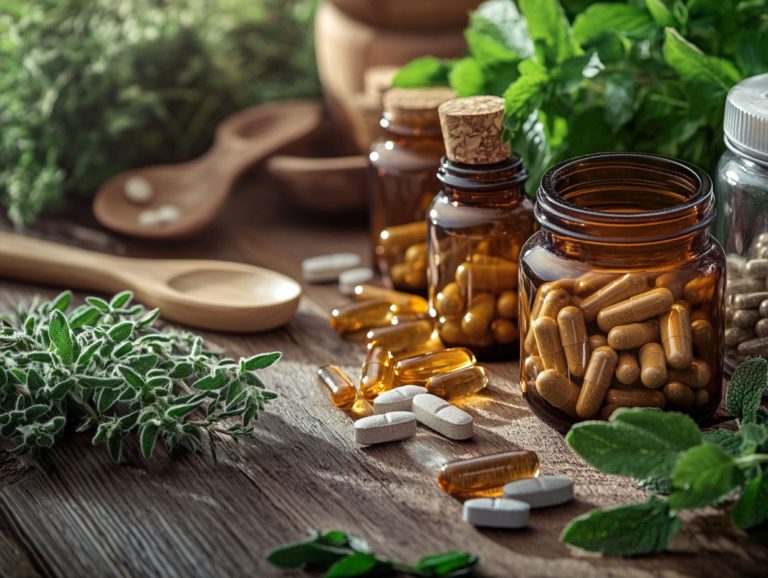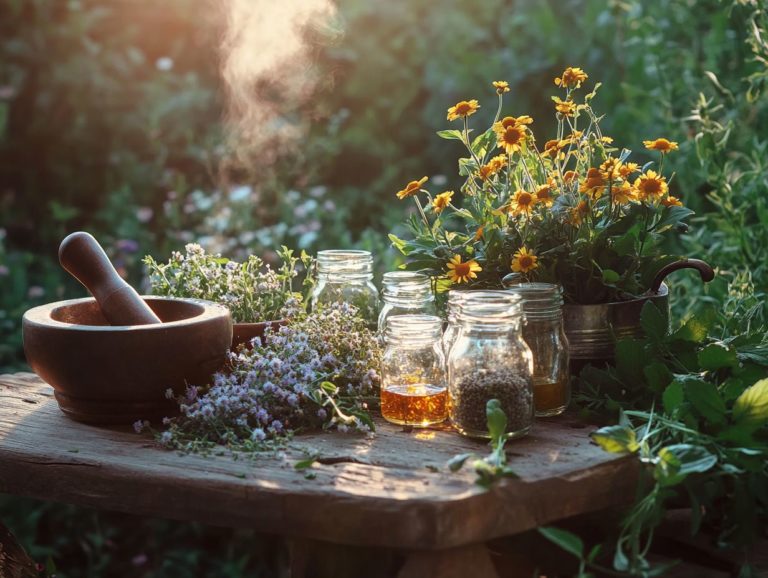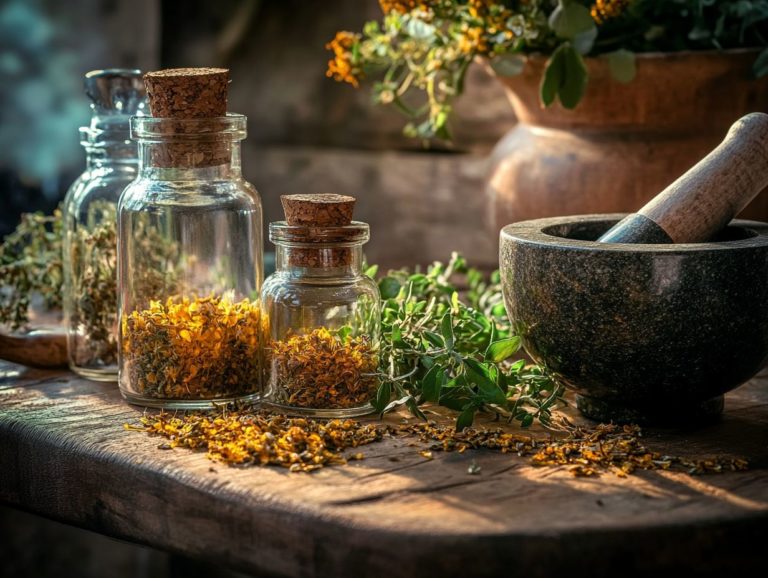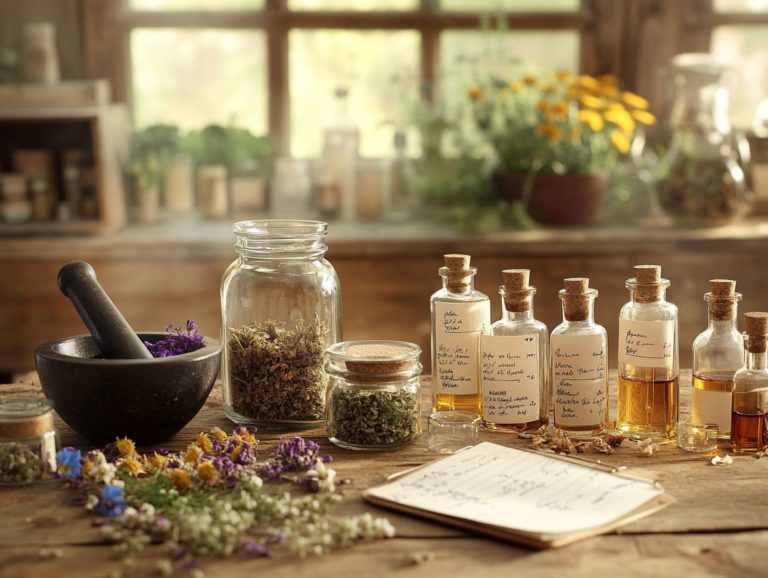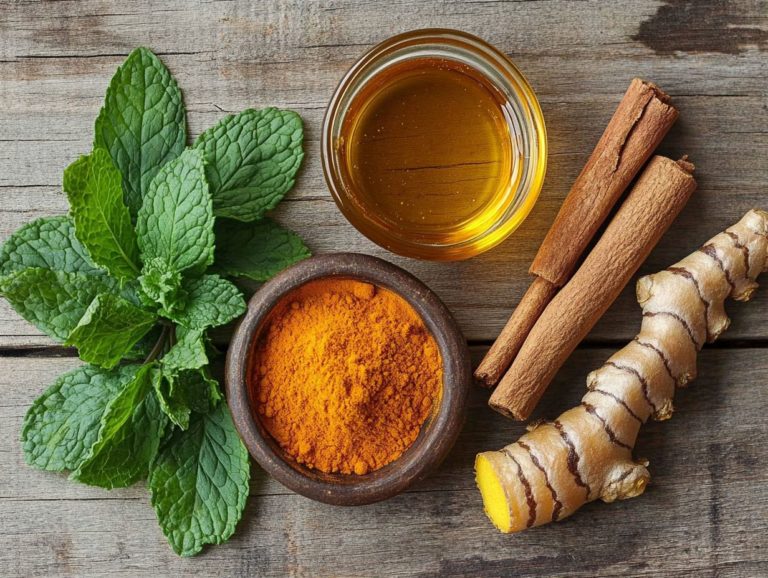How to Store Herbal Remedies Properly?
Proper storage of herbal remedies, including dried herbs and herbal preparations, is crucial for preserving their effectiveness and longevity.
Whether you re a seasoned herbalist or just starting your journey, understanding factors that impact shelf life like light, temperature, and humidity can significantly enhance your experience.
This guide will walk you through best practices for storing herbs, pinpoint common pitfalls to avoid, and offer insightful tips to maximize their shelf life.
It will also discuss what to consider when dealing with expired remedies. By following these guidelines, you can keep your herbal treasures, such as herbal-infused oils and herbal-infused honeys, fresh and potent!
Contents
- Key Takeaways:
- Factors Affecting Shelf Life
- Best Storage Practices for Herbal Remedies
- Common Mistakes in Storing Herbal Remedies
- Tips for Extending Shelf Life
- Using Expired Herbal Remedies
- Frequently Asked Questions
- What is the best way to store herbal remedies properly?
- Should herbal remedies be kept in the refrigerator?
- Can I store herbal remedies in plastic containers?
- How long can I store herbal remedies for?
- Do I need to label my herbal remedies?
- What should I do if my herbal remedies start to smell or look different?
Key Takeaways:
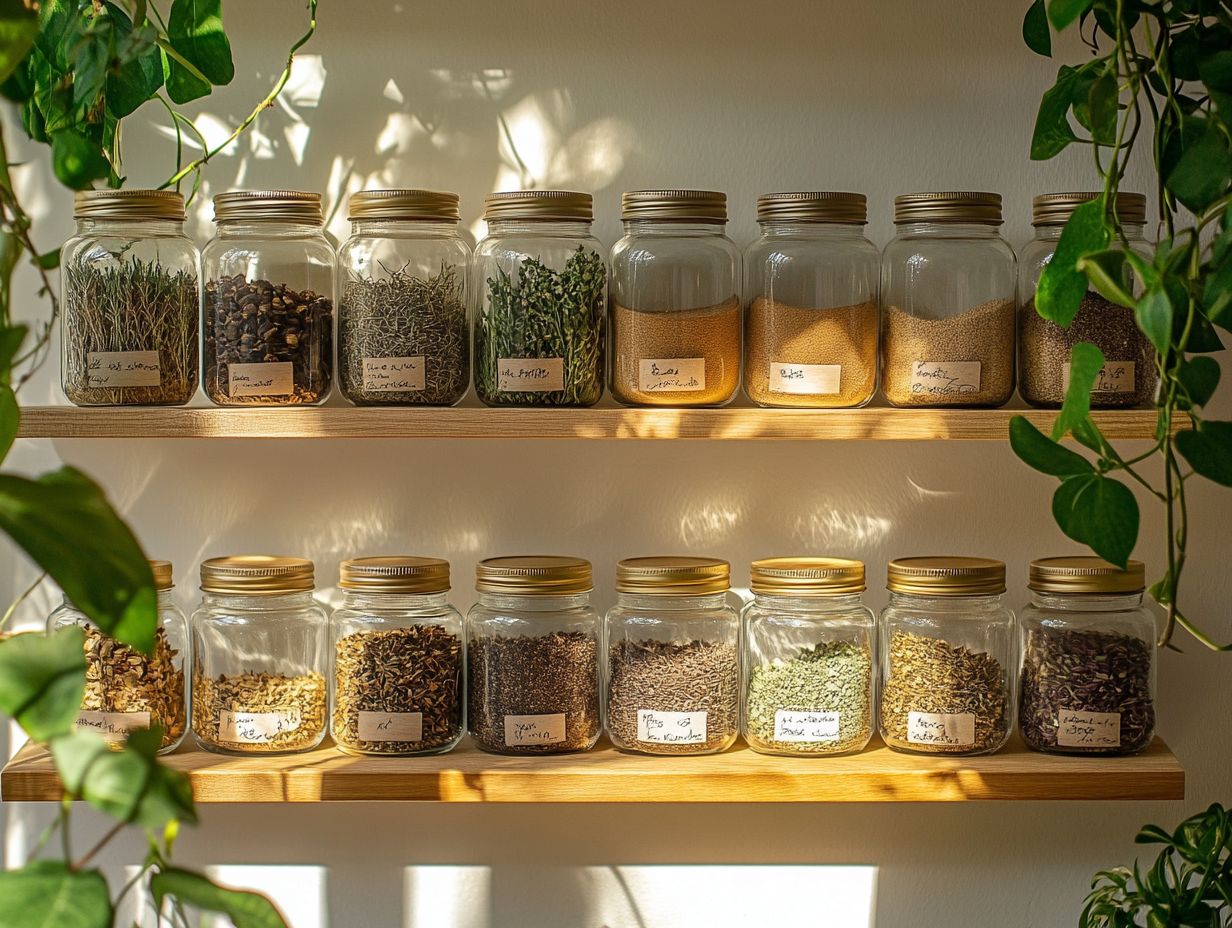
- Store herbs properly to maintain their effectiveness and safety.
- Protect your herbs from light, heat, and humidity to extend their shelf life.
- Use appropriate containers, label them, and avoid spoilage and contamination.
Why Proper Storage is Important
Proper storage of dried herbs and herbal preparations is essential for maintaining their freshness and longevity and ensuring their effectiveness in herbal medicine.
Without appropriate storage solutions, even high-quality herbs can degrade over time, leading to diminished potency in remedies like tinctures, salves, and infusions.
This knowledge is vital for anyone, whether you’re a novice or a seasoned herbalist. It helps you create an effective herbal medicine cabinet that retains the quality and benefits of your products.
Exposure to light, air, and moisture can significantly compromise these natural treasures. For example, herbs stored in clear plastic containers may quickly lose their vibrancy and medicinal properties.
Use dark glass jars or airtight containers to prevent this deterioration. These options provide a barrier against environmental factors while allowing easy access to different preparations.
Label your containers with contents and date of preparation to ensure older herbs are used first. This maximizes efficacy and reduces waste.
Factors Affecting Shelf Life
The shelf life of dried herbs and herbal preparations depends on several crucial factors: light, temperature, and humidity levels.
Direct sunlight can cause even the finest herbs to suffer from degradation in quality.
Inappropriate temperature and humidity can lead to spoilage, diminished potency, and contamination. Understanding these elements is crucial for anyone growing herbs for health or using herbal extracts and powders in their remedies.
Light, Temperature, and Humidity
Light, temperature, and humidity are pivotal elements that dramatically influence the quality of your stored herbs and herbal products. Excessive light can break down essential oils and compounds, while high temperatures accelerate deterioration.
Elevated humidity can foster mold growth and spoilage. Therefore, using suitable storage containers that mitigate these risks is essential.
Choose dark, airtight containers that protect your herbs from light and insulate against temperature fluctuations. Store your herbs in a cool, dry place, away from heating sources.
Monitor humidity levels with hygrometers. Incorporating silica gel packs inside storage containers absorbs excess moisture. Regularly check your herbs for signs of spoilage to preserve their potency and flavor.
By adopting these best practices, you can ensure the therapeutic properties and aromatic qualities of your herbs remain intact over time!
Start implementing these storage techniques today to enhance your herbal experience!
Best Storage Practices for Herbal Remedies
By implementing the best storage practices for your herbal remedies, you ensure their effectiveness and longevity. This preserves the therapeutic properties of each ingredient.
Utilizing airtight glass jars and amber glass bottles is crucial. These containers safeguard your herbal-infused oils and tinctures from harmful light and air exposure, which can degrade their quality over time.
By following these practices, you can maintain a well-organized herbal apothecary that optimally preserves your treasured herbal products.
Containers and Packaging Options
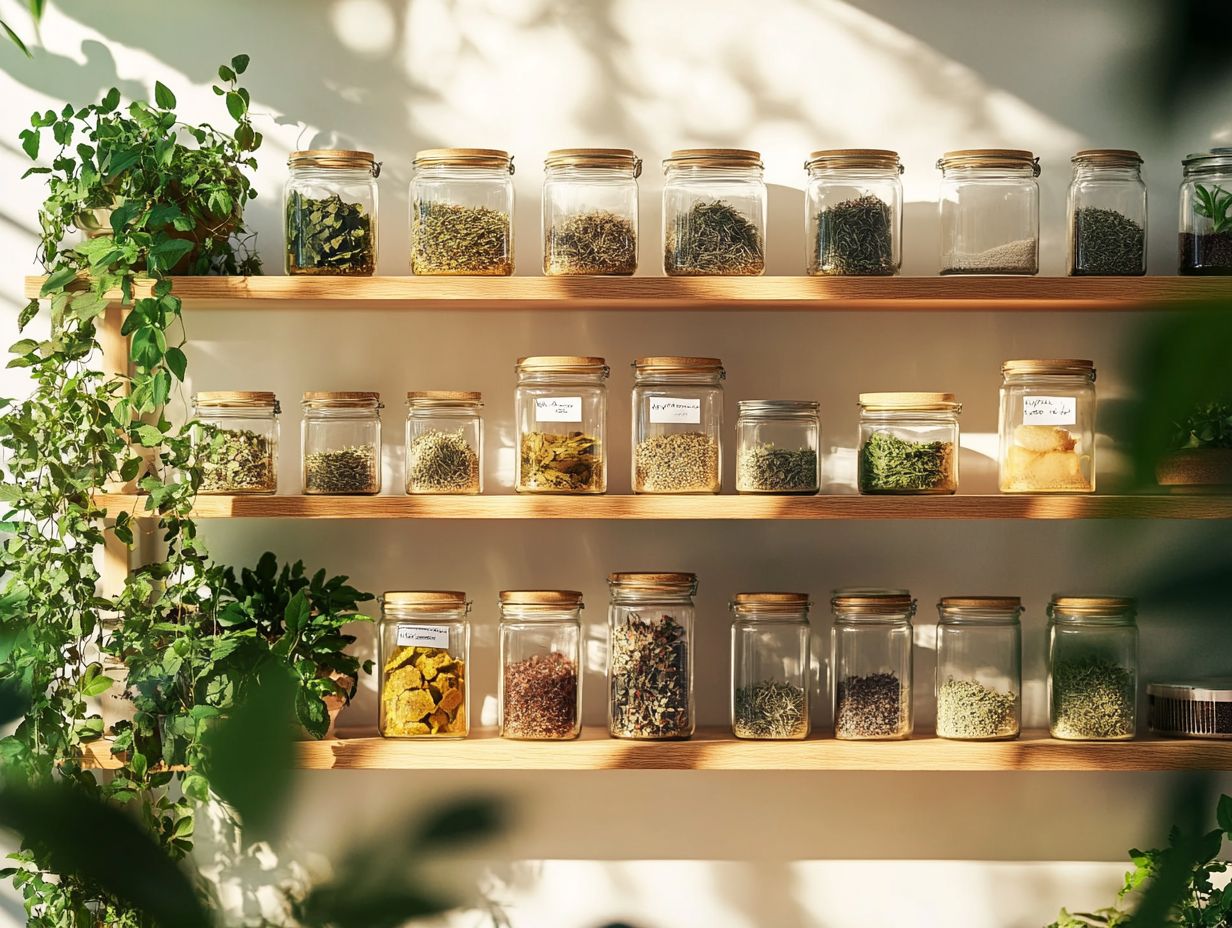
Selecting the right containers and packaging for your herbal remedies is essential for preserving their quality and extending their shelf life.
In addition to amber glass bottles and airtight glass jars, consider options like dark glass jars and vacuum-sealed bags. Each offers distinct advantages against environmental influences.
Dark glass jars effectively shield sensitive ingredients from harmful UV rays. This is vital for maintaining their potency. On the other hand, vacuum-sealed bags are bags that remove air to keep herbs fresh, significantly reducing oxidation.
You might also want to explore biodegradable packaging options. These provide an eco-friendly choice that appeals to environmentally-conscious consumers. Ultimately, choosing the most suitable packaging not only prolongs the shelf life of your herbal remedies but also enriches the overall experience for users.
Labeling and Organizing
Make labeling and organizing a fun part of your herbal practice! Properly labeling and organizing your herbal products is crucial for ensuring easy access and efficient use of your remedies.
A well-structured herbal medicine cabinet, paired with a comprehensive herbal storage chart, will significantly enhance your ability to identify and utilize high-quality herbs, tinctures, and salves with ease. This organizational system allows you to quickly locate what you need, maximizing the benefits of your herbal preparations.
To create an effective labeling system, include:
- the name of each herb
- its primary uses
- preparation methods like teas or tinctures
Opt for clear, waterproof labels to maintain readability over time. Organizing your cabinet by categories such as digestive, immune support, or topical applications will allow you to access your remedies swiftly, especially in urgent situations.
Regularly audit your cabinet, discarding expired products and replenishing commonly used items. This will streamline your herbal practice further, ensuring that your herbal resources remain fresh and readily available whenever you need them.
Common Mistakes in Storing Herbal Remedies
Identifying and steering clear of common mistakes in storing herbal remedies is essential for preserving their integrity and effectiveness. Many herbalists unknowingly expose their high-quality herbs to less-than-ideal conditions, resulting in spoilage, contamination, and diminished potency.
Recognizing these pitfalls ensures that your herbal products maintain their safety and efficacy. This supports your journey in herbal medicine with confidence.
Avoiding Spoilage and Contamination
To effectively avoid spoilage and contamination of your herbal remedies, it s essential to adhere to specific storage tips. Safeguard your high-quality herbs from environmental factors by storing them in airtight containers and maintaining a stable environment.
Keep your herbs away from direct sunlight and heat sources, as light can diminish their potency over time. Using dark glass jars or opaque containers will further protect them from harmful UV rays.
Regularly inspect your herbs for signs of deterioration, such as discoloration or unpleasant odors. This is vital in preserving their quality. Employing vacuum sealing can significantly extend their shelf life.
By implementing these practical tips, you can greatly enhance the longevity and effectiveness of your herbal remedies, ensuring they remain a trusted source of wellness.
Tips for Extending Shelf Life
Extending the shelf life of your herbal remedies while preserving their freshness and potency requires strategic storage techniques. By understanding the unique needs of different herbal products and applying effective storage tips, you can protect the beneficial properties of your tinctures, salves, and infused oils for longer periods.
With the right approach, your herbal creations can maintain their effectiveness, ensuring you enjoy their full benefits whenever you need them.
Preserving Freshness and Potency
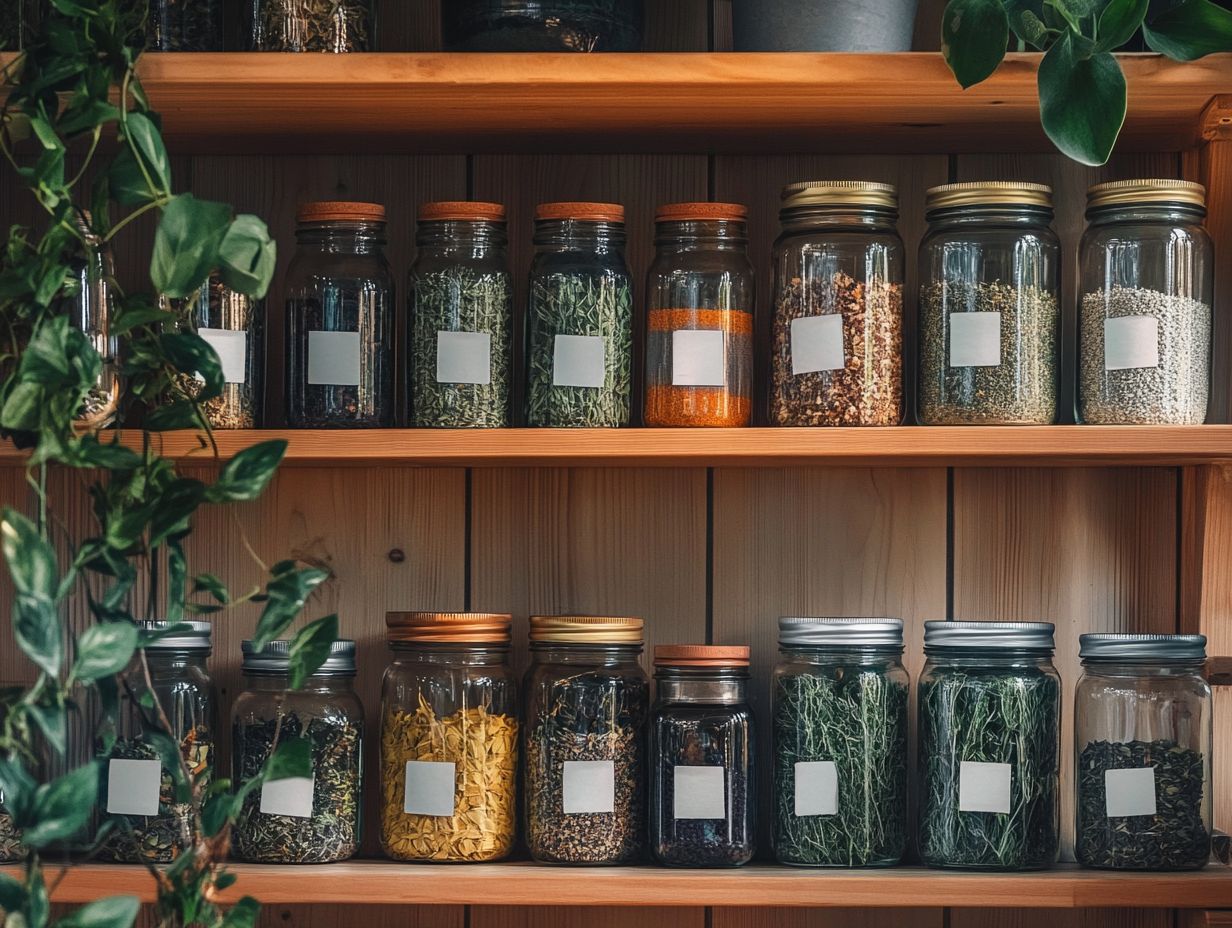
Preserving the freshness and potency of your herbal remedies is vital for maintaining their therapeutic effects over time. Use techniques like vacuum sealing and appropriate storage containers, and keep your herbal tinctures and oils out of direct sunlight to enhance their longevity.
Consider how temperature and humidity affect your herbal products. Storing them in a cool, dry place helps prevent degradation and mold growth, safeguarding their quality. For more information, refer to this guide on safely storing herbal remedies for dosage. Use amber or cobalt-colored glass containers to filter out harmful UV rays, extending the lifespan of your essential oils and tinctures. Regularly check for changes in color, scent, or texture to catch any potential spoilage early.
By following these methods, you can ensure that your herbal remedies remain as potent and effective as possible.
Using Expired Herbal Remedies
Using expired herbal remedies raises important safety and effectiveness concerns that every herbalist should recognize. Over time, these products lose potency, which may compromise their therapeutic benefits.
In some cases, using expired remedies may lead to adverse effects instead of the intended healing. Always keep an eye on the quality and freshness of herbal products to ensure optimal outcomes.
Safety and Effectiveness Considerations
When handling expired herbal remedies, it s crucial to consider both safety and effectiveness. Expired products might lack the potency you seek, and they could pose health risks if contaminated or stored incorrectly. As an herbalist, you should check your herbal medicines carefully before use.
Start by inspecting the packaging for any signs of damage, such as tears or discoloration, which could affect the product’s integrity. Conduct sensory assessments by noting the color, smell, and texture to identify spoilage. Keep in mind that certain herbal remedies can interact with medications, adding to the safety concerns.
It’s critical to prioritize sourcing fresh, high-quality herbs and to educate your clients about proper storage. This ensures their safety and the full therapeutic benefits of the herbal remedies you provide.
Frequently Asked Questions
What is the best way to store herbal remedies properly?
The best way to store herbal remedies is in a cool, dry place away from direct sunlight. This helps keep the herbs fresh and potent for longer.
Should herbal remedies be kept in the refrigerator?
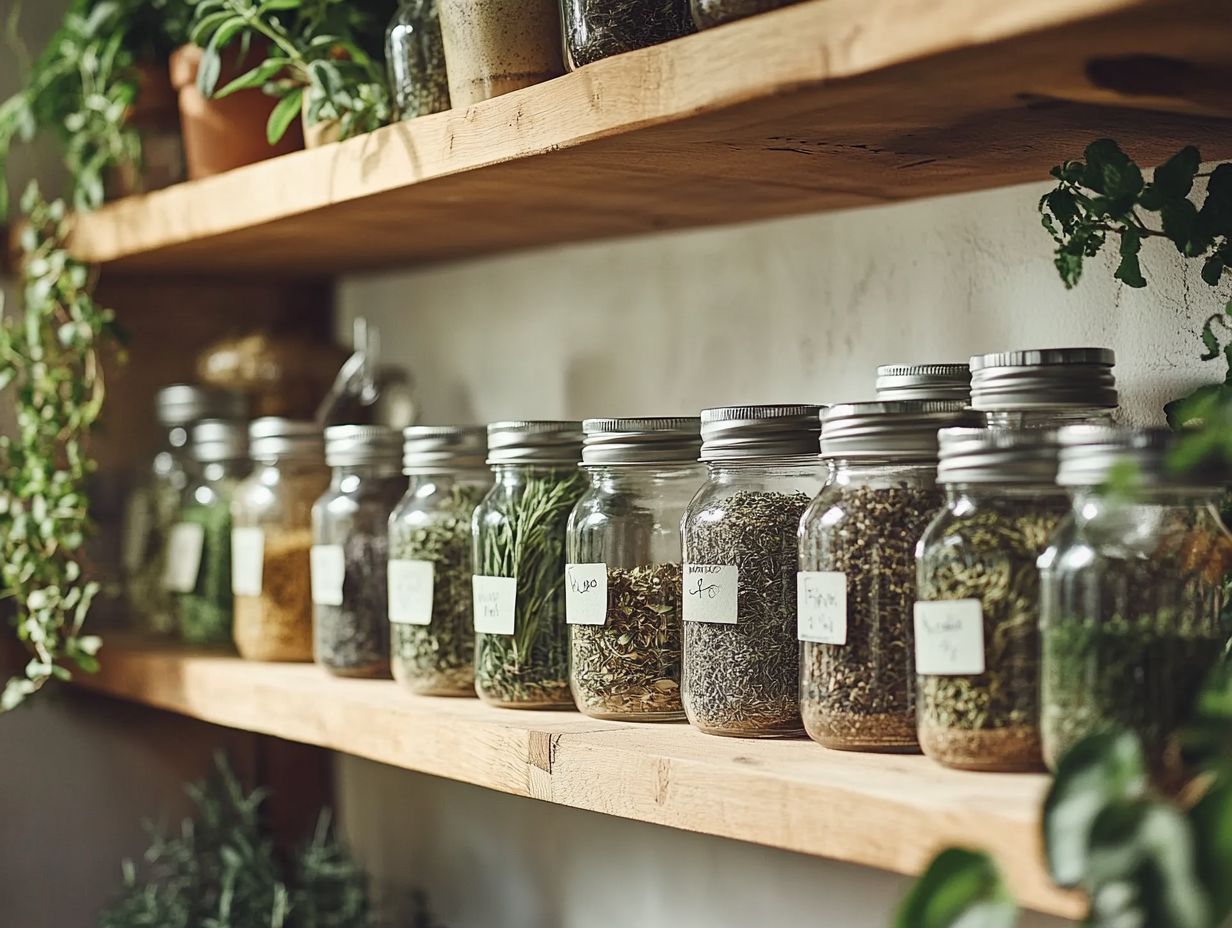
Some herbal remedies should be refrigerated, while others should not. Fresh herbs or herbal tinctures may benefit from refrigeration, but dried herbs should be kept in a cool, dry place.
Can I store herbal remedies in plastic containers?
It is not recommended to store herbal remedies in plastic containers. Chemicals in plastic can leach into the herbs and affect their potency. Glass containers are a better option for storing herbs.
How long can I store herbal remedies for?
The shelf life of herbal remedies varies depending on the type of herb and storage conditions. Generally, dried herbs can last up to a year, while fresh herbs and herbal tinctures may last for a few months.
In conclusion, follow these tips to ensure the safety and effectiveness of your herbal remedies. Always check your products and consult a healthcare professional if you have any concerns before use.
Do I need to label my herbal remedies?
Label your herbal remedies with the herb s name and the storage date. This helps you know how strong they are and when they expire.
What should I do if my herbal remedies start to smell or look different?
If your herbal remedies smell or look different, get rid of them right away. This could mean they are no longer safe to use.

